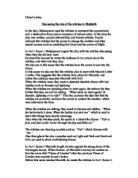Equivocation in MacbethIn Macbeth, Shakespeare uses the theme of equivocation to effectively illustrate the evil nature of the witches. Equivocation is the use of ambiguous expressions in order to mislead. The prophecies of the witches play a mischief in this play, as they are a form of deception that at times use vague language to dodge an issue. The three influential prophecies, which the witches make in this play, are that the protagonist Macbeth will become the king of Scotland, Banquo will be the father of the king of Scotland, and Macbeth will not be killed until the Birnam wood moves to Dunsinane hill. The sources of these prophecies are the witches who put together the devious words into Macbeth's mind, which demonstrates the evil nature of the witches. In Macbeth, one of the earliest prophecies that the witches make is that Macbeth will become the king of Scotland. "All hail, Macbeth! that shalt be king hereafter!"(I.iii.50) is the
prophecy in which no indication of the doom of Macbeth is present. The literal meaning of this apocalypse is that Macbeth will become the king of Scotland. Thus, his ambition to take the pursuit of breaking the natural order to become the king becomes ungovernable. This is evident when Macbeth is shown hallucinating of a dagger before he kills Duncan, the real king of Scotland. Macbeth says, "Is this a dagger, which I see before me, / The handle toward my hand? Come let me clutch thee"(II.i.33-34), which shows that he is in a great doubt on whether to assassinate ...
This is a preview of the whole essay
prophecy in which no indication of the doom of Macbeth is present. The literal meaning of this apocalypse is that Macbeth will become the king of Scotland. Thus, his ambition to take the pursuit of breaking the natural order to become the king becomes ungovernable. This is evident when Macbeth is shown hallucinating of a dagger before he kills Duncan, the real king of Scotland. Macbeth says, "Is this a dagger, which I see before me, / The handle toward my hand? Come let me clutch thee"(II.i.33-34), which shows that he is in a great doubt on whether to assassinate Duncan or not. The metaphorical meaning of the revelation disclosed by the witches is that Macbeth will ultimately be ruined in the future after he reaches his ambition of becoming the king, as he will have to face the resistance of the loyal nobles of king Duncan including Banquo, Macduff, Malcom, etc. Macbeth is greatly affected by this prophecy and becomes the target of the mendacious and perplexing words spoken by the witches and kills the king. Hence, the witches are of evil nature because they indirectly ruin Macbeth's life. Another evil prophecy of the witches is that Banquo is to be the father of the king of Scotland. This lies in conflict with the prophecy described above, which states that Macbeth will be the king, because he is not the son of Banquo. The emblematic meaning of this prophecy is that Banquo will die, as he would create potential resistance for Macbeth, and Macbeth will not let his ambition let down, therefore, Banquo's life is at high risk. Later in the play, Macbeth conspires to kill his best friend, Banquo, and the latter tells his son, Fleance, that he would take revenge for father's death. Banquo says, "O, treachery! Fly, good Fleance, fly, fly, fly! / Thou mayst revenge. O slave!"(III.iv.18-19). The misleading and ambiguous nature of the witches is very well reflected in this prophecy. Third Witch: Hail! First Witch: Lesser than Macbeth, and greater. Second Witch: Not so happy, yet much happier. Third Witch: Thou shalt get kings, though thou be none: So all hail, Macbeth and Banquo! (I.iii.64-68) The words "Lesser" and "greater", and "Not so happy" and "happier" are total contrast to each other, and they imply cryptic meaning which has been explained above. The witches use supernatural powers to prophesize the hidden meaning that evinces their evil nature. Another major prophecy that the witches make after Macbeth becomes the king of Scotland is that he cannot be killed until the great Birnam wood moves to Dunsinane hill. Again, Macbeth takes the literal meaning and believes that the Birnam wood has to move to Dunsinane hill supernaturally, which is not possible under normal circumstances; hence, he becomes carefree and jovial. The irony is that the trees of Birnam wood could be cut and held onto hands to help hide the enemies of Macbeth, which would assist them to kill him, and simultaneously, cause the Birnam wood to move to the Dunsinane hill as prophesized by the witches. The prophecy, "Macbeth shall never vanquish'd be until / Great Birnam wood to high Dunsinane hill / Shall come against him." (IV.1.92-94), is not very much explicit. Macbeth fell into his tragic flaw of ambition and ignored the metaphorical meaning of the prophecy. He says, "That will never be: / Who can impress the forest, bid the tree" (IV.i.94-95). Macbeth is finally killed at the end of the play, and Malcom becomes the king of Scotland, which signifies the return of order. In this tragic play, the witches ruin brave Macbeth's life by setting a trap that exploits his tragic flaw of ambition through the use of equivocal language. The indulgence of the witches in his life by making prophecies remarks for their supernatural evilness. Equivocation is found in the prophecies of the witches. Macbeth revolves around these prophecies; hence, equivocation plays an important role in this play. It is due to equivocation in these prophecies that Macbeth becomes disoriented and looses his balance, which makes this play a successful tragedy. Hence, the theme of equivocation extensively demonstrates the evil nature of the witches.








